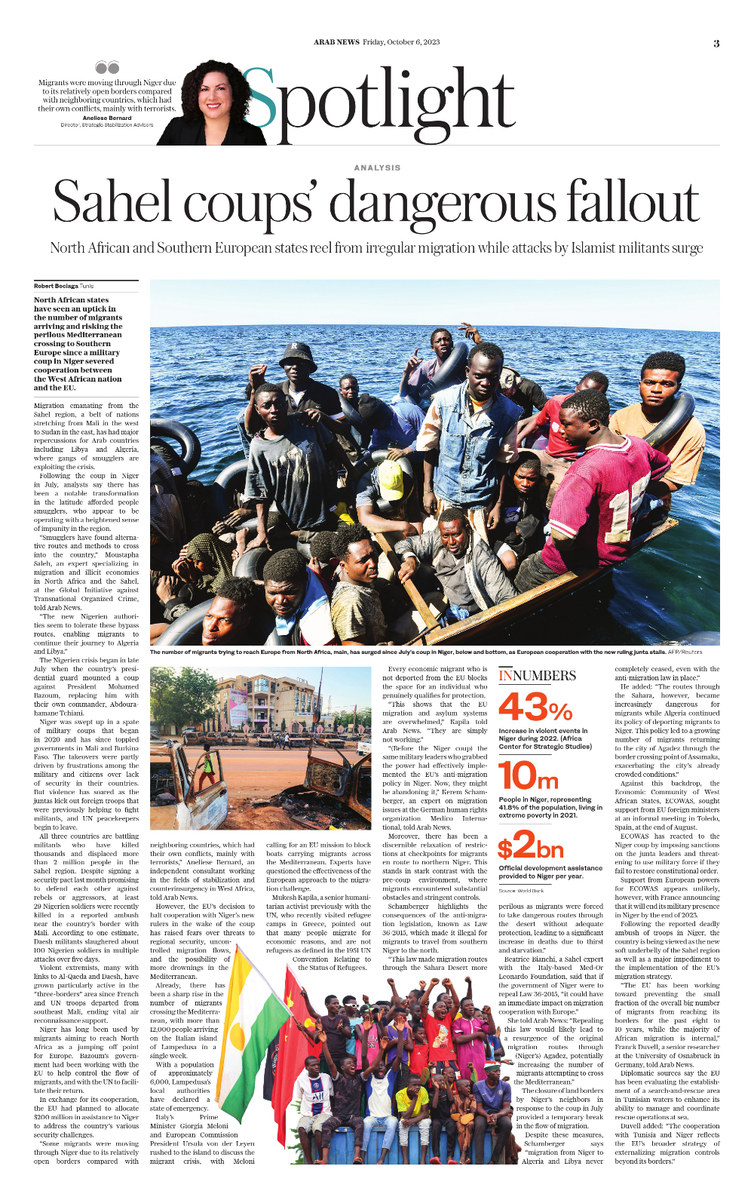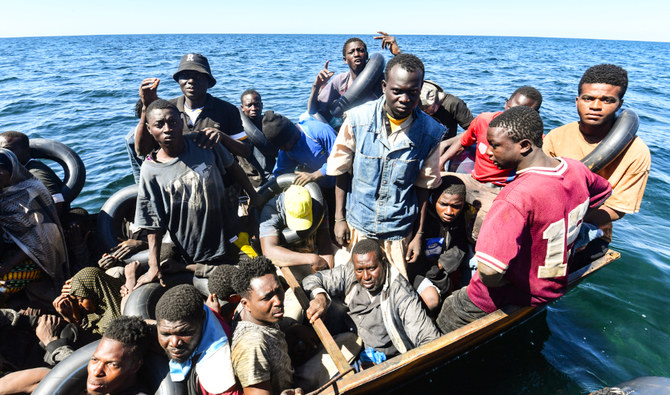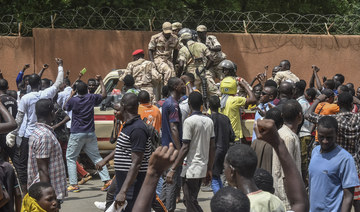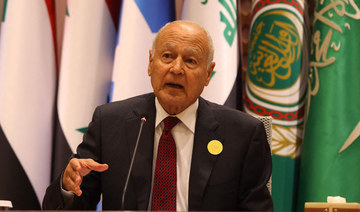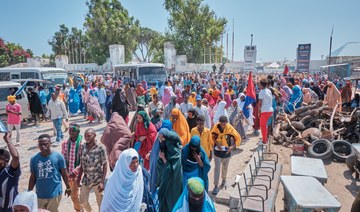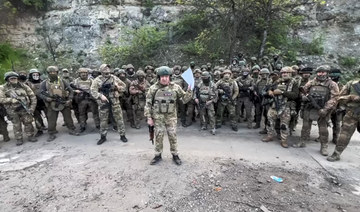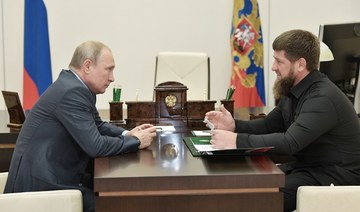TUNIS: North African states have seen an uptick in the number of migrants arriving and risking the perilous Mediterranean crossing to Southern Europe since a military coup in Niger severed cooperation between the West African nation and the EU.
Migration emanating from the Sahel, a belt of nations stretching from Mali in the west to Sudan in the east, has had major repercussions for Arab countries including Libya and Algeria, where gangs of smugglers are exploiting the crisis.
Following the coup in Niger in July, analysts say there has been a notable transformation in the latitude afforded people smugglers, who appear to be operating with a heightened sense of impunity in the region.
“Smugglers have found alternative routes and methods to cross into the country,” an expert on migration and illicit economies in North Africa and the Sahel told Arab News.

The EU had planned to allocate $200 million in assistance to Niger to address the country’s various security challenges. (AFP)
“The new Nigerien authorities seem to tolerate these bypass routes, enabling migrants to continue their journey to Algeria and Libya.”
The Nigerien crisis began in late July when the country’s presidential guard mounted a coup against President Mohamed Bazoum, replacing him with their own commander, Abdourahamane Tchiani.
Niger was swept up in a spate of military coups that began in 2020 and has since toppled governments in Mali and Burkina Faso. The takeovers were partly driven by frustrations among the military and citizens over lack of security in their countries. But violence has soared as the juntas kick out foreign troops that were previously helping to fight militants, and UN peacekeepers begin to leave.
All three countries are battling militants who have killed thousands and displaced more than 2 million people in the Sahel region. Despite signing a security pact last month promising to defend each other against rebels or aggressors, at least 29 Nigerien soldiers were recently killed in a reported ambush near the country’s border with Mali. According to one estimate, Daesh militants slaughered about 100 Nigerien soldiers in multiple attacks over five days.
Violent extremists, many with links to Al-Qaeda and Daesh, have grown particularly active in the “three-borders” area since French and UN troops departed from southeast Mali, ending vital air reconnaissance support.
Niger has long been used by migrants aiming to reach North Africa as a jumping off point for Europe. Bazoum’s government had been working with the EU to help control the flow of migrants, and with the UN to facilitate their return.
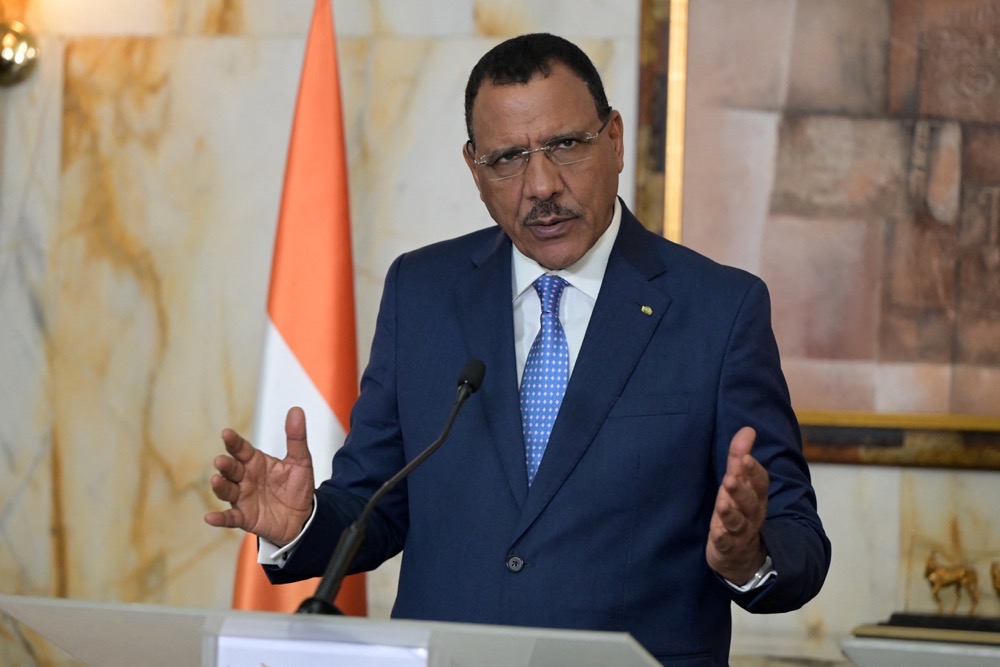
The Nigerien crisis began in late July when the country’s presidential guard mounted a coup against President Mohamed Bazoum. (AFP)
In exchange for its cooperation, the EU had planned to allocate $200 million in assistance to Niger to address the country’s various security challenges.
“Some migrants were moving through Niger due to its relatively open borders compared with neighboring countries, which had their own conflicts, mainly with terrorists,” Aneliese Bernard, an independent consultant working in the fields of stabilization and counterinsurgency in West Africa, told Arab News.
However, the EU’s decision to halt cooperation with Niger’s new rulers in the wake of the coup has raised fears over threats to regional security, uncontrolled migration flows, and the possibility of more drownings in the Mediterranean.
As stated already, there has been a sharp rise in the number of migrants crossing the Mediterranean, with more than 12,000 people arriving on the Italian island of Lampedusa in a single week.
With a population of approximately 6,000, Lampedusa’s local authorities have declared a state of emergency.
Italy’s Prime Minister Giorgia Meloni and European Commission President Ursula von der Leyen rushed to the island to discuss the migrant crisis, with Meloni calling for an EU mission to block boats carrying migrants across the Mediterranean.
Experts have questioned the effectiveness of the European approach to the migration challenge.
INNUMBERS
• 43% Increase in violent events in Niger during 2022. (Africa Center for Strategic Studies)
• 10m People in Niger, representing 41.8% of the population, living in extreme poverty in 2021.
• $2bn Official development assistance provided to Niger per year.
Source: World Bank
Mukesh Kapila, a senior humanitarian activist previously with the UN, who recently visited refugee camps in Greece, pointed out that many people migrate for economic reasons, and are not refugees as defined in the 1951 UN Convention Relating to the Status of Refugees.
Every economic migrant who is not deported from the EU blocks the space for an individual who genuinely qualifies for protection.
“This shows that the EU migration and asylum systems are overwhelmed,” Kapila told Arab News. “They are simply not working.”
“(Before the Niger coup) the same military leaders who grabbed the power had effectively implemented the EU’s anti-migration policy in Niger. Now, they might be abandoning it,” Kerem Schamberger, an expert on migration issues at the German human rights organization Medico International, told Arab News.
Moreover, there has been a discernible relaxation of restrictions at checkpoints for migrants en route to northern Niger. This stands in stark contrast with the pre-coup environment, where migrants encountered substantial obstacles and stringent controls.
Schamberger highlights the consequences of the anti-migration legislation, known as Law 36-2015, which made it illegal for migrants to travel from southern Niger to the north.
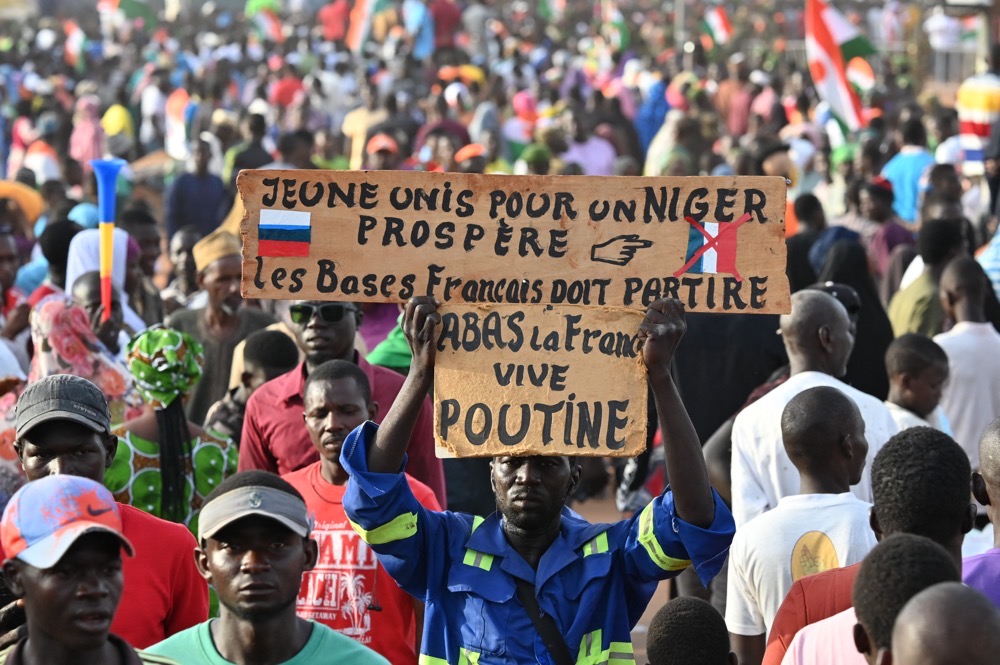
Supporters of Niger’s CNSP protest outside the Niger and French airbase in Niamey. (AFP)
“This law made migration routes through the Sahara Desert more perilous as migrants were forced to take dangerous routes through the desert without adequate protection, leading to a significant increase in deaths due to thirst and starvation.”
Beatrice Bianchi, a Sahel expert with the Italy-based Med-Or Leonardo Foundation, said that if the government of Niger were to repeal Law 36-2015, “it could have an immediate impact on migration cooperation with Europe.”
She told Arab News: “Repealing this law would likely lead to a resurgence of the original migration routes through (Niger’s) Agadez, potentially increasing the number of migrants attempting to cross the Mediterranean.”
Niger’s pre-coup government was not a completely reliable partner, however.
While it played a central role in the EU anti-migration strategy in the West African region and received large sums of money as development aid, “there has been a significant disconnect between this funding and its actual impact on the ground, with people accusing the government of stealing those funds,” said Schamberger.
“In the eyes of many, the funds seemed to flow into the pockets of influential politicians, the military, and economic elites, rather than supporting the local economy or the people.”
And this is not the first time that allegations have emerged about EU funds, provided in exchange for help on the migration issue, being misused by recipient nations.
In 2019, The Associated Press news agency reported that EU funds given to Libya to stem migration were frequently stolen or misappropriated.
From 2016 to 2018, the EU allocated more than $200 million in funding to Sudan, resulting in migrants being forced to take increasingly dangerous routes out of the country, according to a 2018 report by the New Humanitarian.
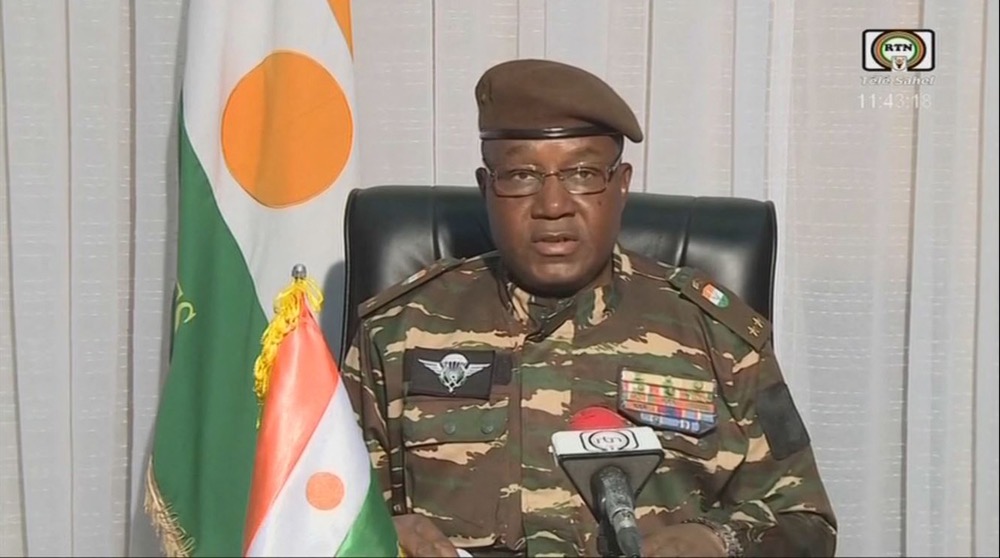
General Abdourahamane Tiani speaks on national television in Niger after the ouster of President-elect Mohamed Bazoum. (Télé Sahel/AFP)
The UN’s International Organization for Migration, or IOM, says that border closures and airspace restrictions resulting from the coup have placed hundreds of thousands of migrants and displaced persons at risk.
The closure of land borders by Niger’s neighbors in response to the coup provided a temporary break in the flow of migration.
Despite these measures, Schamberger says “migration from Niger to Algeria and Libya never completely ceased, even with the anti-migration law in place.”
He added: “The routes through the Sahara, however, became increasingly dangerous for migrants while Algeria continued its policy of deporting migrants to Niger. This policy led to a growing number of migrants returning to the city of Agadez through the border crossing point of Assamaka, exacerbating the city’s already crowded conditions.”
Against this backdrop, the Economic Community of West African States, ECOWAS, sought support from EU foreign ministers at an informal meeting in Toledo, Spain, at the end of August.
ECOWAS has reacted to the Niger coup by imposing sanctions on the junta leaders and threatening to use military force if they fail to restore constitutional order.
Support from European powers for ECOWAS appears unlikely, however, with France announcing that it will end its military presence in Niger by the end of 2023.
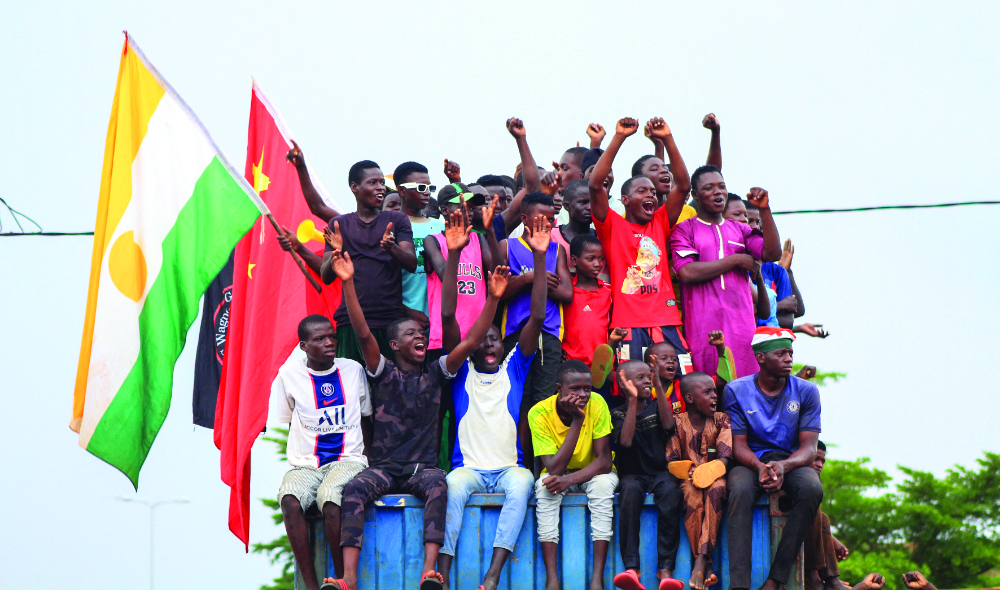
Niger junta’s supporters hold rally to demand the French army leave. (Reuters)
Following the reported deadly ambush of troops in Niger, the country is being viewed as the new soft underbelly of the Sahel region as well as a major impediment to the implementation of the EU’s migration strategy.
“The EU has been working toward preventing the small fraction of the overall big number of migrants from reaching its borders for the past eight to 10 years, while the majority of African migration is internal,” Franck Duvell, a senior researcher at the University of Osnabruck in Germany, told Arab News.
Diplomatic sources say the EU has been evaluating the establishment of a search-and-rescue area in Tunisian waters to enhance its ability to manage and coordinate rescue operations at sea.
Duvell added: “The cooperation with Tunisia and Niger reflects the EU’s broader strategy of externalizing migration controls beyond its borders.”
